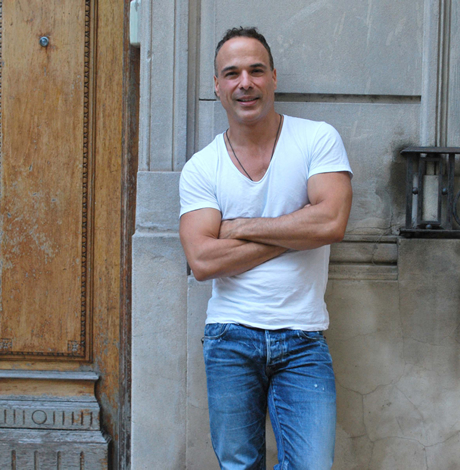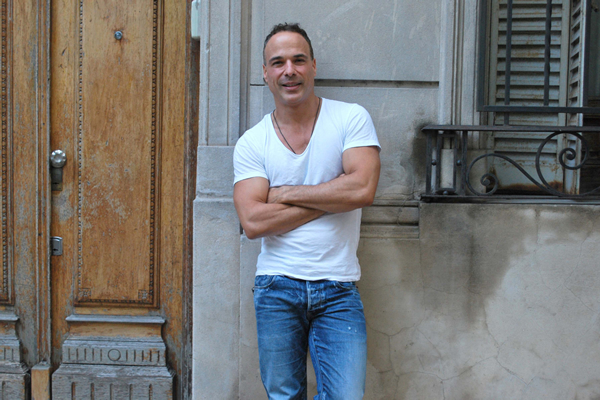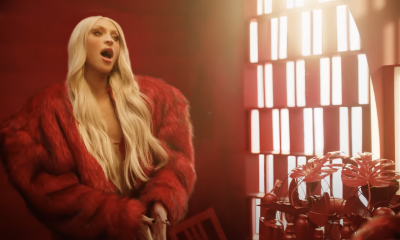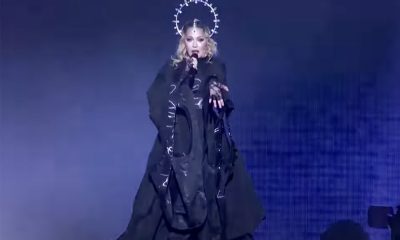Theater
Cirque du Soleil director reflects on zig-zagging career
Out director served as creative director for Madonna’s 2012 Super Bowl halftime show


Michel Laprise says ‘KURIOS’ is unlike any other show Cirque du Soleil has ever done. (Photo by Martin Girard, courtesy Cirque du Soleil)
Cirque du Soleil
‘KURIOS — Cabinet of Curiosities’
July 21-Sept. 18
Lerner Town Square at Tysons II
8025 Galleria Dr., Tysons, Va.
Tickets starting at $39
Michel Laprise loves big projects. The charming and whip-smart out director served as creative director for Madonna’s 2012 Super Bowl halftime show and directed her “MDNA Tour.” More recent credits include writer/director of Cirque du Soleil’s latest touring show “KURIOS — Cabinet of Curiosities” soon to set up its distinctive Grand Chapiteau (Big Top) in Tysons Corner, Va.
Inspired by the Victorian era’s surge of invention and creativity and imbued with a “French steam punk” aesthetic, “Kurios” premiered in Montréal in April 2014 and is Cirque du Soleil’s 35th production. Like Cirque du Soleil’s other shows, “Kurios” reinvents circus by combining the basics — tent, clowns and acrobats — with sophistication and the artistic elements of theater.
Recently, Laprise shared thoughts via phone from Montréal where he’s based about “Kurios,” Cirque du Soleil and Madonna, whom he calls M.
For a lot of people, Cirque du Soleil’s innovative aspects have become familiar. Is the pressure to remain cutting edge massive?
Yes, but it’s a pressure we put on ourselves. I hear people say, “I’ve seen Cirque once. I don’t need to see it again.” For us it’s a mission to constantly reinvent ourselves. “Kurios” is different from other shows. The characters are real people in real clothes. The set itself is a laboratory that someone inhabits and not the abstract magical place like in our other shows.
What led you to staging big productions? Did it happen by accident?
Well nothing happens by accident, only by passion. I’m a group person, so the bigger the project, the more people you get to play with. I’ve never looked at the obstacles, only the destination, which is to make people happy and storytelling. It’s like a big surprise party for a lot of people. When I joined Cirque 15 years ago to do casting, I styled auditions to be an intense two-day mini-workshop. Because most of the acrobats were not speaking English or French, I used my intuition to touch their talent and did my best to bring it out. Over the years, the artists who were cast encouraged me to direct. Eventually I told Cirque co-founder Guy Laliberté that I wanted to direct. Of course he wasn’t yet ready to give me a $30 million dollar project like “Kurios,” but he knew I came from theater and was a professional director so he made me special events designer. And eventually he allowed me to conceive and direct my show which was a longtime ambition of mine.
What’s the inspiration behind “Kurios”?
My dream was to do a show where a character accesses a parallel world and brings poetry and imagination back to earth. We live in a world where we can do so much. I can ring Tokyo for free on Internet right now. Yet it’s a very complex time of scarcity for many people. I want to help people believe that everything is possible, because I think it is. And I want them to feel joy. The show is set in the latter half of the 19th century, a time of invention and innovation. Lots was happening — the railroad, telegraph, gramophone, electricity. Suddenly invisible energy was stimulating people’s imaginations. Not accidentally, it was also the golden age of magic and illusionists. Magicians were the rock stars of the era.
Does being gay make you a better director?
I’ve always been gay so I don’t know any other way. But I do believe that going through the process of coming out to self and family and friends gives you a sense of compassion and allows you to appreciate diversity. And that I think makes for a better director. Of course I’m generalizing. There are assholes in every community. Within Cirque, same-sex couples are respected and celebrated. So being gay here isn’t an issue.
Why especially should LGBT people come to see “Kurios?”
Critics and fans say this is Cirque’s best touring show in 10 years. It’s more theatrical than most of Cirque’s other productions and what’s more, there’s a rainbow and disco ball in the show. I don’t want to spoil the surprise of when they appear. There’s also a lot of love and inclusiveness in the show. The planets were well aligned when we created this show. And of course the acrobats and what they can do with their bodies is amazing. To reach their level skill, they begin training at age 5 and live a strictly disciplined lifestyle. They eat tiny bites of food throughout the day. Stretch a couple hours before every performance.
I’d be doing our readers a disservice if I didn’t ask the next question.
You want to know whether or not I’m single?
No. I’d like to hear about working with Madonna.
Before working with Madonna in 2012, I presented my ideas to her manager. He liked them so he took me to her. She appeared in the room. I told her my thoughts and she was smiling as I spoke. Then she asked me to listen to “Give Me All Your Luvin’” the first track of her then-new album “MDNA.” M’s hands were shaking a little bit as we listened. So I thought that if after 30 years she’s still nervous to show new work, then this is somebody who really cares about what they’re doing. I knew then that I wanted to work her. For the first week of rehearsals for “MDNA,” M hurt her ankle and broke her little finger. I asked to slow down pace. She said, “No Michel.” That’s the job. It’s like going to war with her. She thinks like an acrobat. Her work ethic is incredible. She’s also very demanding but it’s nothing I wouldn’t expect from a woman of that level. She never yelled at me. The only time she raised her voice during rehearsal was when the schedule wasn’t allowing her to see her kids. Despite the pressure on her, she was calm and focused with brilliant sense of humor. She teases me about my (French Canadian) accent which is less strong now than it was. I don’t do a lot of pop music shows, but I’d definitely like to work with her again. We stay in touch. She sent me flowers on my birthday.
And are you single?
I am. But that might be changing. Some romance may be in the works, but that’s all I’ll say.

‘A Wrinkle in Time’
Through July 20
Arena Stage
1101 Sixth St., S.W.
Tickets range from $59-$209
Arenastage.org
Currently at Arena Stage, talented out actor and singer Taylor Iman Jones is rekindling an old friendship with an adored character of fiction.
Broadway vet Jones is starring as 13-year-old Meg Murry in “A Wrinkle in Time,” the world-premiere musical adaptation of Madeleine L’Engle’s same-titled book.
For many readers, especially women, the classic 1962 young adult novel, was their first foray into sci-fi, particularly one with a female protagonist.
The story centers on Meg, an awkward schoolgirl whose physicist father has mysteriously disappeared. Now, Meg, her popular friend Calvin, and smart younger brother Charles Wallace are tasked with moving through time and space to find him. Along the way they encounter adventure and evil.
For Jones, 33, playing 13-year-old Meg feels freeing in ways. She says, “As you get older, you’re told to grow up, so I like letting go of some of that. To feel feelings in their rawest form and to tap back into that is fun. I like the spontaneity. There are highs and lows to revisit.”
Born and raised in the San Francisco Bay Area, Jones began piano lessons at just six and soon added band and plays to their pursuits. Following high school, she made a deep dive into California theater for seven years before making the big move to New York in 2017 where after just two months she was singing on Broadway.
The determined and appealing Jones, who lives in New York with their partner, boasts an impressive bio. She has appeared on Broadway as Catherine Parr, Henry VIII’s sixth and final wife in Six, and in the original casts of “Head Over Heels” and “Groundhog Day.” She’s been seen in national tours of “Hamilton” and “American Idiot.”
WASHINGTON BLADE: It seems “A Wrinkle in Time” and Meg mean a lot to a lot of people.
TAYLOR IMAN JONES: The book tells the story of a girl with so much undiscovered power who’s accomplishing things she never imagined that she could.
BLADE: Can you relate?
JONES: Meg wears her emotions on her sleeve. I can certainly relate to that. I’m a Pisces. Sometimes being hyperemotional and very empathetic can feel like a burden, but as I’ve matured, I have realized that it’s not a bad quality. And it’s something I’ve learned to harness and to enjoy. I love that I can play a role like Meg in front of thousands of people.
BLADE: Was “Wrinkle in Time” a book you knew well?
JONES: Oh yeah, it’s a favorite book that lives in my heart and my mind. It’s one of the first books that taught me about the adventure of reading.
BLADE: And playing a favorite character must be a kick.
JONES: It really is.
BLADE: Meg is a big part in a big show.
JONES: This musical is huge. They’re traveling through space and meeting people on different planets. 20-person cast. 30 songs in the show. Quite the undertaking and I’m proud of us. I’m on stage for the entire musical and I sing four or five numbers.
As a mezzo soprano I guess you’d say I have the luxury of being able to do a lot of musicals that span a lot of different genres: rock musical, pop musical, and standards. “A Wrinkle in Time” is contemporary musical theater.
For me, singing is probably the least difficult part of the show. What’s harder for me is the way Meg experiences trauma; I need to be careful when I’m screaming and yelling.
BLADE: It seems mostly women have been involved in making this production happen (book by Lauren Yee; music and lyrics by Heather Christian; directed by Lee Sunday Evans; and choreography by Ani Taj.)
JONES: It’s true, the director, writer, etc., and most of our producers are all women. This doesn’t happen most of the time. For me it means new ideas and fresh energy, and pushing the limits of musical theater.
It’s also created a wonderful space in which to work. It can be more generous, and understanding. And centering the story on a young girl is something we can all relate to.
BLADE: Will “A Wrinkle in Time” resonate with queer theatergoers and their families?
JONES: I think so, especially on the heels of pride month. It’s truly a show for all ages about finding your inner strength and fighting for the things that you love; not letting evil win over the power of good, and not just for yourself but for those around you too.
Theater
‘Andy Warhol in Iran’ a charming look at intersection of art, politics
Mosaic production plumbs kidnapping plot of iconic artist for humor

‘Andy Warhol in Iran’
Through July 6
Mosaic Theater Company at Atlas Performing Arts Center
1333 H St., N.E., WDC
$70
Mosaictheater.org
Behind the blasé veneer, Andy Warhol was more curious than people knew. Particularly when it came to money. He kept a close eye on how the ultra-rich lived, what fellow artists were being paid and who was paying them, and, of course, all the new and more saleable ways of making and selling art.
In playwright Brent Askari’s “Andy Warhol in Iran,” now playing at Mosaic Theater Company, Warhol (Alex Mills) is brought outside of his usual area of interest when he lands face to face with a young revolutionary. While Warhol could be artistically revolutionary, he didn’t connect with the idea of forgoing the pursuit of money and fame for the infinitely more difficult task of achieving social justice.
The 90-minute play is not fully factual, but rather inspired by Warhol’s real life 1976 trip to Tehran to make portraits of the royal Pahlavi family in the waning days of their reign, with a focus on Farah Diba, the Shah’s elegant wife and Iran’s last empress.
The action unfolds in a Tehran hotel suite boasting a glorious view of the snowcapped Alborz Mountains not far from Iran’s vibrant and bustling capital. It’s here, disguised as room service, that Farhad (played by Nathan Mohebbi) gains entrance to Warhol’s rooms, seeking to kidnap the pop art star to garner attention for the university students’ movement.
Warhol meets the armed intruder with a sort of wide-eyed wonderment, flummoxed why he has been selected for abduction. Warhol can’t understand why a young man like Farhad wouldn’t prefer to be paid a big ransom on the spot, or be cast as a star in one of the Warhol Factory flicks.
When Farhad replies it’s because Warhol is the most decadent artist in the world, Warhol mistakenly takes it for the ultimate compliment. After all, his biggest successes had been connected to celebrity and consumerism (think Campbell’s Soup Cans. 1962).
For Warhol, decadence is aspirational. He made portraits of financiers, movie stars, and jet setters. In fact, he’d been obsessed with the lives of the rich and famous since he was a small kid in Pittsburgh thumbing through Photoplay Magazine while bed bound with Saint Vitus Dance.
Accompanying Warhol to Tehran (unseen) are his business manager Fred Hughes, and Bob Colacello, editor of Interview magazine. Together, they make a merry trio of gay social climbers. These kinds of trips were a boon to the artist. Not only did they solidify a new strata of high society contacts, but were also superbly lucrative, thickly padding the painter’s pockets.
While in Iran, Warhol wanted only to view Farah’s vast world-class collection of jewels, sample the caviar on tap, and get his Polaroids. Then he’d fly first class back to New York and transfer the images to silk screen and sell the portraits to the Persian royals at a hefty price. He didn’t foresee any obstacles along the way.
Serge Seiden’s direction is spot on. He’s rendered a wonderfully even two-hander with a pair of terrifically cast actors. And Seiden plumbs the piece for humor mostly drawn from the absurdity of the situation without missing any of the serious bits.
As Warhol, out actor Mills is instantly recognizable as the eccentric artist. He’s wearing the button-down shirt, jeans, blazer, glasses, and, of course the famed shock of white hair wig (here a little more Karen than Andy). His portrayal is better than an imitation. He gives a bit of the fey and confused, but has also infuses him with a certain dynamism.
The energy works well with the intensity of Mohebbi’s would-be kidnapper Farhad. And while it isn’t a romance, it’s not impossible to think that Warhol might fall for a handsome male captor.
The connection between art and politics is almost always interesting; and though not a super deep dive into the era or the life of an artist, “Andy Warhol in Iran” is a compelling, charming, and sometimes funny glimpse into that intersection.
Theater
‘Hunter S. Thompson’ an unlikely but rewarding choice for musical theater
‘Speaks volumes about how sad things land on our country’

‘The Untitled Unauthorized Hunter S. Thompson Musical’
Through July 13
Signature Theatre
4200 Campbell Ave., Arlington, Va.
$47 to $98
Sigtheatre.org
The raucous world of the counterculture journalist may not seem the obvious choice for musical theater, but the positive buzz surrounding Signature Theatre’s production of Joe Iconis’s “The Untitled Unauthorized Hunter S. Thompson Musical” suggests otherwise.
As the titular, drug addled and gun-toting writer, Eric William Morris memorably moves toward his character’s suicide in 2005 at 67. He’s accompanied by an ensemble cast playing multiple roles including out actor George Salazar as Thompson’s sidekick Oscar “Zeta” Acosta, a bigger than life Mexican American attorney, author, and activist in the Chicano Movement who follows closely behind.
Salazar performs a show-stopping number — “The Song of the Brown Buffalo,” a rowdy and unforgettable musical dive into a man’s psyche.
“Playing the part of Oscar, I’m living my Dom daddy activist dreams. For years, I was cast as the best friend with a heart of gold. Quite differently, here, I’m tasked with embodying all the toxic masculinity of the late ‘60s, and a rampant homophobia, almost folded into the culture.”
He continues, “My sexuality aside, I like to think that Oscar would be thrilled by my interpretation of him in that song.
“Our upbringings are similar. I’m mixed race – Filipino and Ecuadorian and we grew up similarly,” says Salazar, 39. “He didn’t fit in as white or Mexican American, and fell somewhere in the middle. Playing Oscar [who also at 39 in 1974 forever disappeared in Mexico], I pulled out a lot of experience about having to code switch before finally finding myself and being confident just doing my own thing.
“As we meet Oscar in the show we find exactly where’s he’s at. Take me or leave me, I couldn’t care less.”
In 2011, just three years after earning his BFA in musical theater from the University of Florida in Gainesville, Salazar fortuitously met Iconis at a bar in New York. The pair became fast friends and collaborators: “This is our third production,” says George. “So, when Joe comes to me with an idea, there hasn’t been a moment that I don’t trust him.”
In “Be More Chill,” one of Iconis’s earlier works, Salazar originated the role of Michael Mell, a part that he counts as one of the greatest joys of artistic life.
With the character, a loyal and caring friend who isn’t explicitly queer but appeals to queer audiences, Salazar developed a fervent following. And for an actor who didn’t come out to his father until he was 30, being in a place to support the community, especially younger queer people, has proved incredibly special.
“When you hear Hunter and Oscar, you might think ‘dude musical,’ but I encourage all people to come see it.” Salazar continues, “Queer audiences should give the show a shot. As a musical, it’s entertaining, funny, serious, affecting, and beautiful. As a gay man stepping into this show, it’s so hetero and I wasn’t sure what to do. So, I took it upon myself that any of the multiple characters I play outside of Oscar, were going to be queer.
Queer friends have seen it and love it, says Salazar. His friend, Tony Award-winning director Sam Pinkleton (“Oh, Mary!”) saw Hunter S. Thompson at the La Jolla Playhouse during its run in California, and said it was the best musical he’d seen in a very long time.
“Since the work’s inception almost 10 years ago, I was the first Oscar to read the script. In the interim, the characters’ relationships have grown but otherwise there have been no major changes. Still, it feels more impactful in different ways: It’s exciting to come here to do the show especially since Hunter S. Thompson was very political.”
Salazar, who lives in Los Angeles with his partner, a criminal justice reporter for The Guardian, is enjoying his time here in D.C. “In a time when there are so many bans – books, drag queens, and travel — all I see is division. This is an escape from that.”
He describes the Hunter Thompson musical as Iconis’s masterpiece, adding that it’s the performance that he’s most proud of to date and that feels there a lot of maturity in the work.
“In the play, Thompson talks to Nixon about being a crook and a liar,” says Salazar. “The work speaks volumes about how sad things land on our country: We seem to take them one step forward and two steps back; the performance is almost art as protest.”
-

 U.S. Supreme Court2 days ago
U.S. Supreme Court2 days agoSupreme Court to consider bans on trans athletes in school sports
-

 Out & About3 days ago
Out & About3 days agoCelebrate the Fourth of July the gay way!
-

 Virginia3 days ago
Virginia3 days agoVa. court allows conversion therapy despite law banning it
-

 Maryland5 days ago
Maryland5 days agoLGBTQ suicide prevention hotline option is going away. Here’s where else to go in Md.












